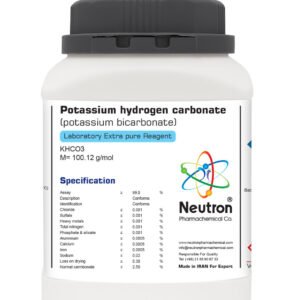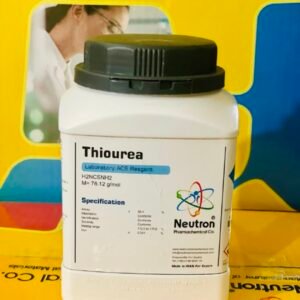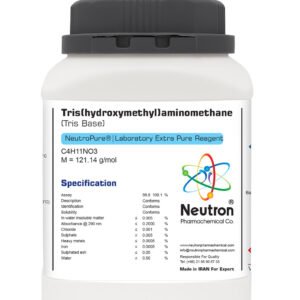4 دی متیل آمینو بنزالدهید
| Formula | C9H11NO |
| Chemical formula | C9H11NO |
| molar mass | 149.19 g/mol |
| CAS number | 100-10-7 |
| HS Code | 29223900 |
| EC number | 202-819-0 |
| Storage | Store at 15 to 25° c |
| SDS | available |
| Odour | characteristic |
| Form | solid |
| Color | yellow to greenish |
| Inition temperature | 445° c |
| Solubility in water | 0.3 g/l |
| Solubility in ethanol | freely soluble |
| Flash point | 100° c |
| Boiling point | 176 – 177° c |
| Melting point | 72 – 75° c |
| Assay | ≥ | 98 | % |
| Appearance | Conforms | ||
| Solubility | Conforms | ||
| Identification | Conforms | ||
| Melting Range | 70 to 75 | °c | |
| Related substances by TLC | ≤ | 0.5 | % |
| Appearance of solution A & B | Conforms |
4-Dimethylaminobenzaldehyde is a pale yellow crystalline organic compound used primarily as a reagent in chemical analysis and detection of amines. It is known for its role in colorimetric tests and its ability to form intensely colored complexes with certain biological and chemical substances.
🏭⚗️ Production
4-Dimethylaminobenzaldehyde is typically synthesized via the formylation of dimethylaniline through a modified Vilsmeier–Haack reaction, using dimethylformamide (DMF) and phosphorus oxychloride (POCl₃) as reagents. The product is then purified by crystallization or distillation to obtain a solid compound of high analytical grade.
🔬 Properties
The chemical formula of 4-Dimethylaminobenzaldehyde is C₉H₁₁NO, with a molar mass of approximately 149.19 g/mol. It appears as yellow to light orange crystals or powder and has a faint aromatic odor. It has a melting point of about 72–74 °C and is moderately soluble in organic solvents such as ethanol, methanol, and acetone, but only slightly soluble in water. The compound contains both aldehyde and dimethylamino functional groups, which contribute to its reactivity in condensation and color-forming reactions.
🧪 Applications
4-Dimethylaminobenzaldehyde is widely used as a reagent in analytical chemistry, particularly in the Ehrlich test for detecting indoles and other primary aromatic amines. It is commonly used in forensic science, biochemical assays, and drug analysis to identify compounds such as tryptophan, serotonin, and lysergic acid derivatives. The reagent forms highly colored Schiff bases when reacted with amines, making it valuable in colorimetric detection and UV-visible spectroscopy. It is also used in organic synthesis and as an intermediate in dye and pigment production.
⚠️ Safety
4-Dimethylaminobenzaldehyde should be handled with care, as it may cause irritation to the skin, eyes, and respiratory tract. Prolonged or repeated exposure can be harmful, and ingestion should be avoided. Protective equipment such as gloves, lab coats, and safety goggles is recommended when handling the compound. It should be stored in a cool, dry place away from light, heat sources, and strong oxidizers. Adequate ventilation is essential during use to avoid inhalation of dust or vapors.





